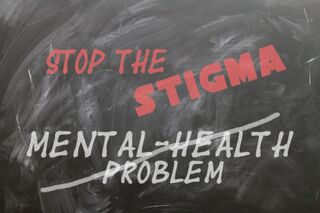Psychiatry
The Dangers of Anti-Psychiatry Ideology: An Interview
Part 2: Why spreading mental health disinformation is stigmatizing and harmful.
Posted September 24, 2020
To say that the topic of anti-psychiatry is a contentious issue would be an understatement. For me personally—and for other evidence-based health care advocates with whom I am acquainted—discussing it publicly has invited both online trolling and harassment. But when it comes to health, silence is not an option. Scientists and health professionals are ethically responsible for promoting established science and evidence-based health care.
In this vein, I decided to discuss the topic of anti-psychiatry openly with some esteemed colleagues. I was also recently interviewed by Vice Senior Staff Editor Shayla Love for an excellent article that she wrote, entitled "The Movement Against Psychiatry." With her permission, what follows below is Part 2 of the transcript of our interview (Part 1 can be found here).
Before reading: It is important to strongly emphasize that anti-psychiatry is an ideology—it is not any one person. Health care practices demand divorcing ideas from people so that claims can be scrutinized and so that evidence-based health care advocacy can be fulfilled.

Do the tenets of anti-psychiatry threaten to harm some mentally ill patients? How? Have you seen any of this harm firsthand?
Anti-psychiatry rhetoric not only distracts from valid scientific criticism within psychiatry, but it can ultimately compromise patient care because it stigmatizes people who experience psychiatric disorders, and it aims to deter people from seeking treatment. Even a cursory look at social media spaces—such as within Twitter—makes the anti-psychiatry motive painfully clear.
In my day job, I have witnessed the reluctance of family members to participate in treatment as a result of anti-psychiatry sentiments that they read online. Actively spreading mis- and dis-information about mental health and its treatment is dangerous because it can rob people of seeking evidence-based care. The treatment of psychiatric disorders is a serious enterprise and not a game to be toyed with and exploited in order to push an ideological agenda.
Does anti-psychiatry feed into conspiracy theories about the medical industry at large, big pharma, etc.?
Definitely. Dr. Joseph M. Pierre is a psychiatrist and clinical professor at UCLA and one of the foremost experts on conspiracy theories. He has noted that mistrust of authority often lies at the core of conspiracies and that while those who espouse such views claim to be skeptics, they’re often better thought of as denialists who actively reject evidence, which opens the door to misinformation.
I would also say that it is unsurprising that anti-psychiatry ideology shares features with other anti-science ideologies—such as anti-vaccine ideology—because when we look underneath these ideas, we often find shared underlying beliefs about how one acquires knowledge, as well as anti-scientific values: such as the elevation of anecdote, intuitive thinking, conspiracy theory, postmodern philosophical positions, preferences for alternative medicine, and distrust of scientific authority.
To return to involuntary holds: I've spoken with disability and mental health advocates who have had personal traumatic experiences that shape their views. They want to make it harder to force a person to get treatment, and think of it as a violation of civil rights. Yet, I've also spoken to countless parents who have struggled to help their children with anosognosia because they couldn't get their consent and had to wait until that person reached a "threat" threshold, by which time they ended up in jail or had died by suicide.
I wonder if you have any further thoughts on the question of involuntary treatment/holds, which seems to me to be one of the more significant ways the ideas of anti-psychiatry are actually playing out in the patient population. How can we address the potential issues here, while still making it possible for people to get help if they need it?
Involuntary holds are treatment options afforded to psychiatrists by law. I can certainly appreciate the contentious nature of the topic and that people have experienced both positive and negative outcomes associated with its implementation. From the perspective of psychiatry, ethical involuntary holds require a delicate and accurate determination of safety risk.
Without trying to sound too clichéd, this power requires great responsibility, and it’s been bestowed on psychiatry for a good reason. From the perspective of anti-psychiatry, there exists an irony where on the one hand, it opposes involuntary holds due to restriction of freedom, and on the other hand, it aims to restrict freedom by limiting access to other psychiatric treatment options, such as the freedom to use medications.
Something I've heard a lot in the past week or so is that there is "no evidence" for a "biopsychiatry" model or the chemical imbalance model of disease. I think it's true that we still don't understand the underlying physical causes of mental illness, nor do we have reliable biomarkers. To me, that doesn't indicate there are none—just that we just don't know them yet. But how do you feel about this argument that's been made, and how might you respond to it?
Pointing to the “chemical imbalance” hypothesis is a red herring tactic and abused trope of anti-psychiatry ideology. It’s well known that the oversimplified “chemical imbalance” hypothesis was an early and incorrect way to understand how some psychiatric medications work. Understanding the biological substrates of mental illness and its treatment is incredibly complex, and the goal of much ongoing research.
Speaking of the "chemical imbalance" model, do you think accusing psychiatrists of being too biologically focused is fair or unfair? I've found, with nearly all academic psychiatrists at least, that they all think social factors are involved in mental health too—trauma, poverty, life circumstances, etc. Does this trickle out into clinical care in meaningful ways? I've also been told that despite academics advocating for a kind of biopsychosocial model of health, when people go to the doctor, just the "bio" part is focused on.
Psychiatry and clinical psychology are rightfully biopsychosocial professions—it’s written into the fabric of our diagnostic systems, clinical case formulations, and evidence-based treatment approaches.
The charge that psychiatry practices from a pure “biopsychiatry” perspective is, in my view, a dishonest strawman argument that discounts the fact that in reality, modern psychiatry is an integrated biopsychosocial scientific discipline. It’s therefore ironic and misguided that anti-psychiatry seeks to fault psychiatry for not pinning down an oversimplified single biological cause of mental illness since psychiatry conceptualizes mental illness as a complex integration of biological, psychological, and social factors that interact in ways that don’t lend themselves to oversimplified and cheapened causal models.
Clinically, akin to literally any profession, there will always be variability in terms of the quality and ethics of individual providers. It’s disingenuous to use those individual differences as an attempt to discredit an entire profession. Simultaneously, it’s also true that the practice of some psychiatrists focuses more on biological than psychosocial treatments—and I would contend that the largest driving force behind this reality is one that many psychiatrists would like to see change, which is the systemic perils of the managed care health care system.
The many excellent and well-trained psychiatrists that I know remain vigilant about over-diagnosis and over-treatment; they are patient-centered and evidence-based; they practice conservative prescribing and de-prescribing when appropriate; and they constantly preach "skills over pills"!
As we mentioned before, there's a large spectrum of beliefs, opinions, and experiences here. I think many people would agree that issues like over-medication and social determinants of health are important, and alternative programs (like early psychosis intervention, peer support, etc.) could be a valuable addition to mental health services. What happens when extreme anti-psychiatrists enter this conversation, though? Do you feel it derails "critical psychiatry"—or a good-faith attempt to talk about the problems with psychiatry with the aim of reforming it and making it better?
Absolutely. Anti-psychiatry ideology seeks not to improve psychiatry but to tear it down. Psychiatry itself is a scientific discipline, and therefore criticism is a built-in feature with a view towards improved biopsychosocial patient care.




